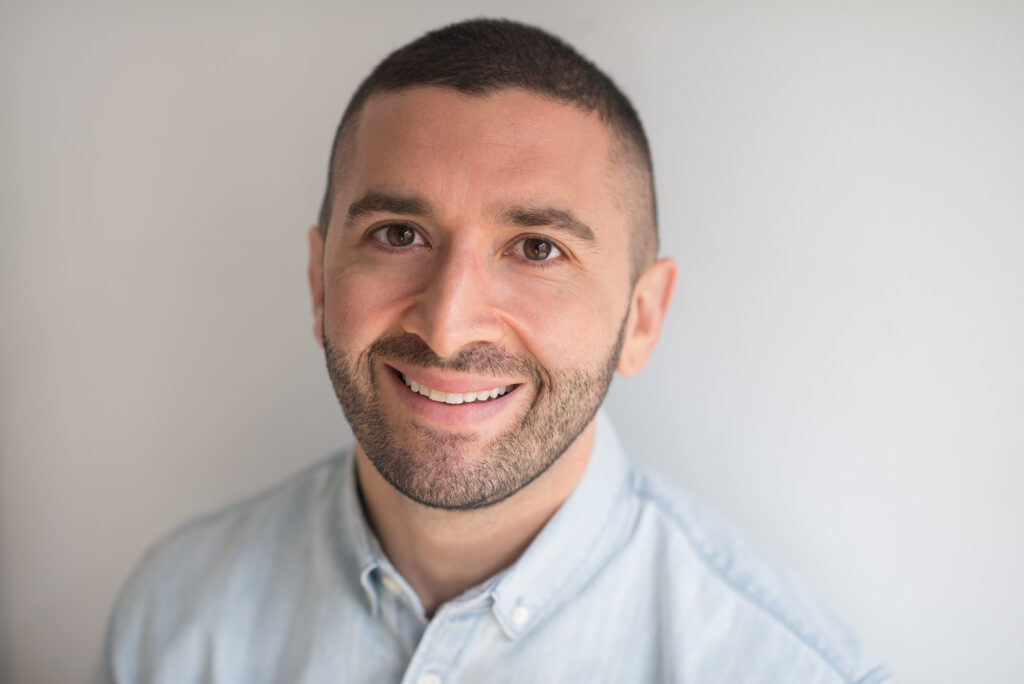Owner of Solace Estate Planning and Meditation Teacher
Age: 44 | Shaker Heights
By Lisa Love

When you were young, what did you think you were going to do?
I would have loved to be a professional ice hockey player. I had dreams of raising the Stanley Cup over my head.
What path did you end up taking instead?
I didn’t have a traditional path to becoming an attorney or a meditation teacher. My undergraduate degree is in athletic training. Once I realized I couldn’t be a professional athlete, I wanted to work with them. I had some really rough employment experiences. One of those was the first time I ever worked with an attorney as a client to navigate a particularly sticky situation. I found that interesting. I was at a point where I saw that I should make a pivot, and law school seemed like the logical progression. I started practicing law in 2008 in New York City for a law firm called Paul Hastings. I was in their investment management practice group. This was a hard time to break into law because the financial markets were crumbling. I started with 50 other first-year associates in the corporate department. When I left three and a half years later, I was one of three.
How did you deal mentally?
Ever since I was a little kid, I dealt with anxiety, depression, and attention deficit. But law school was the first time I couldn’t adapt to the level of demand in a positive way. I got into therapy and started taking medication. But when I landed at my law firm in the fall of 2008 and all these cuts were happening, it terrified me. I kept my head down and kept going. But I thought, I’ve got to do something else to take care of myself. I’m spending way too much time in my therapist’s office. That’s when I looked at some alternatives and found meditation. Once I did, it utterly transformed my life in a matter of days. I was sleeping without Ambien for the first time in years. My anxiety diminished so much people noticed a big change.
People started to say, ‘Hey, what did you do?’
My meditation teacher would come to New York a couple times a year and do workshops. Eventually, he reached out and said, ‘There are people waiting months, sometimes years, to work with me. I could train you, and you could teach.’ In 2013 I started teaching meditation and opened my first studio in New York City. In April of 2015 we opened a second studio. Then I moved to Cleveland and opened my studio in November of 2019.
What challenges did you face in building your meditation business?
The big challenge I faced was COVID. The way I taught meditation was in large group workshops where people spent hours together over a number of days.
When the pandemic hit in March (2020), I was running group meditations over Zoom twice a day. They were open to the public and free. I did that for months to give people support. But over time, we realized we had to move on.
The courses I was teaching didn’t translate well to the virtual world. People weren’t turning on their cameras. It wasn’t the same. In late summer 2020, my partners in New York and I decided to close that studio, and I closed my studio in Cleveland, which was heartbreaking. That caused my pivot back into practicing law.
So what kind of law do you do now? And it’s your own practice, too right?
I am an estate planning attorney. I focus on protecting clients’ assets from probate, long-term care costs, and other predators. To me, meditation and estate planning are two sides of the same coin. The goal in both is peace of mind, and that’s why my firm is called Solace Estate Planning.
How has your Jewish identity or upbringing shaped your approach to life?
It’s particularly important because, as a culture and community, we’ve faced incredible adversity. Whenever I’m having a hard time, I think about my grandparents on my mother’s side or my great-great-great-grandparents on my father’s side and what they had to do to survive. That resolve makes me feel a little bit like a wimp—why is this bothering me? The first-world problems we all tend to get wrapped up in. I take pride in knowing my ancestors have been through so much and not just survived—but thrived for millennia.
If you were to give advice to someone just starting out as an entrepreneur, what would you tell them?
Being an entrepreneur is hard. Despite having great mentors, at the end of the day, it’s on you. You’ve got to keep your head down and keep working. The same things that made you successful in other areas of your life—take that into entrepreneurship.
